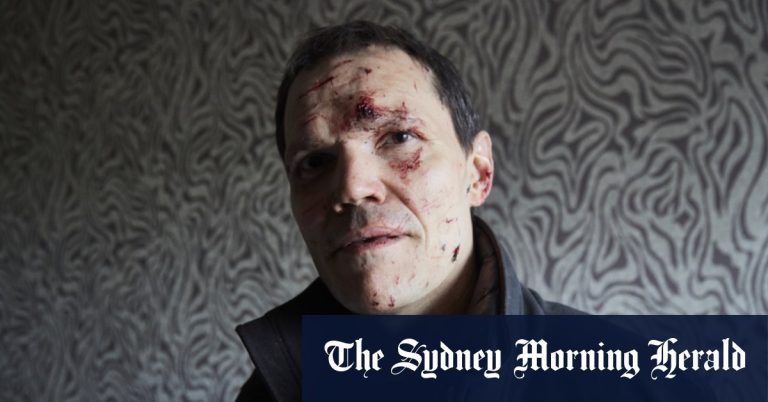“We got no guarantees about 2025.”

Ukrainian President Volodymyr Zelensky is welcomed at a joint meeting of the US Congress in December 2022. Despite initially emphasizing support, Zelensky has no guarantees that financial support from the United States will continue.credit: Bloomberg
Ammunition shortages are already a problem, and they will only improve if Europe learns how to produce weapons again.
Russia faces its own problems with resources and manpower, but maintains its relative size advantage. In a war of attrition, this is important. “While the fat man shrinks, the thin man disappears,” says a Ukrainian intelligence official, citing a well-known local proverb.
Mykhailo Fedorov, deputy prime minister and champion of military technology, says the only way forward is self-reliance.
“We have no choice but to show strength. But I am optimistic. We have a clear advantage in effectiveness and speed.”
He says creative thinking allowed Ukraine to achieve unexpected victories in the Black Sea. During 2023, Ukraine sank a fifth of Russia's Black Sea fleet and created a shipping lane in the face of continued bombardment. The same approach has seen a huge increase in the production of cheap and capable combat drones. Ukraine boasts nearly a dozen long-range models capable of hitting targets more than 600 kilometers away. One manufacturer of long-range drones confidently predicts that 2024 will see the war move deep into Russia's central regions.

Ukraine has achieved success by launching strikes on Russian ships and shipyards in the Crimean Peninsula.
“Putin will have some explaining to do to his people,” he says. “Things will not be easy for him at the local level.”
However, it is Ukraine's domestic politics, not Russia's, that is beginning to look more fragile. Two years of extraordinary political unity have given way to general infighting. President Volodymyr Zelensky has faced a lot of criticism in a tough manner. In early February, he dismissed the highly popular commander of his armed forces, Valery Zalozny, after relations between the two collapsed. The full effects of this risky decision have not yet emerged. On the eve of his dismissal, 94 percent of Ukrainians said they trusted their wartime general, compared to 40 percent for his replacement, Oleksandr Sirsky. A senior government official says he is concerned about the Ukrainian political system's ability to manage rising tensions, and says the Kremlin would like to take advantage of them.
“Russia wants to fire Zelensky because there is no one else who can control the situation,” he says.
A difficult point will come in May, the date when Zelensky's five-year presidential term officially ends. Martial law is clear in allowing a president to continue in office until another is elected, with elections impossible under the same provisions. But the political chatter in Kiev is about the coming brink of legitimacy.
download
Andre Mahira, the constitutional expert whose 2004 decision not to certify the fraudulent vote marked the beginning of a series of protests known as the Orange Revolution, says the criticism is just legal nonsense. But Zelensky is walking a tightrope nonetheless.
“The president will be in office in five years only because there is a war – nothing more, nothing less. He has to understand this, and instead of fighting opponents, try to unite them around him.” So far, grand cooperation has not been Zelensky’s style.
The president can certainly take some comfort in public opinion, which continues to support him, albeit on a downward trajectory. A poll conducted by the Razumkov Center, a local social enterprise, shows that trust in him remains at 70 percent. This is much higher than for the parliament and any potential opposition except Zalozny.
download
The public also largely agrees with Zelensky's tough stance on negotiations with Russia. Razumkov's poll shows that only 18% of them would support making concessions to Russia even if the West stopped supporting it entirely. A third says Ukraine should keep fighting even if left alone; 22% suggest trying to freeze the conflict without making concessions, while the rest have not yet decided.
The real obstacle to any agreement is not so much domestic support as finding a trustworthy negotiating partner.
“For negotiations to succeed, you need to tango,” the senior government official said. “The war is actually very successful for Putin. Why did he stop?”
A Ukrainian military intelligence source indicated that the current rates of use of equipment and ammunition may force the two sides to a temporary ceasefire sometime next year. But he says this will only be a pause, as there is little confidence in reaching a permanent agreement as long as Putin lives. “We know he hates Ukraine and our freedom. “We are a bad example for his community.”
download
For Manukhina, the suggestion of waiting for a change in Russian leadership brought her to tears. She says young people, like herself, are forgotten.
He added: “If we wait until Putin dies, all our men will perish. If nothing else works, we must negotiate.”
© 2024 The Economist Limited. All rights reserved.

